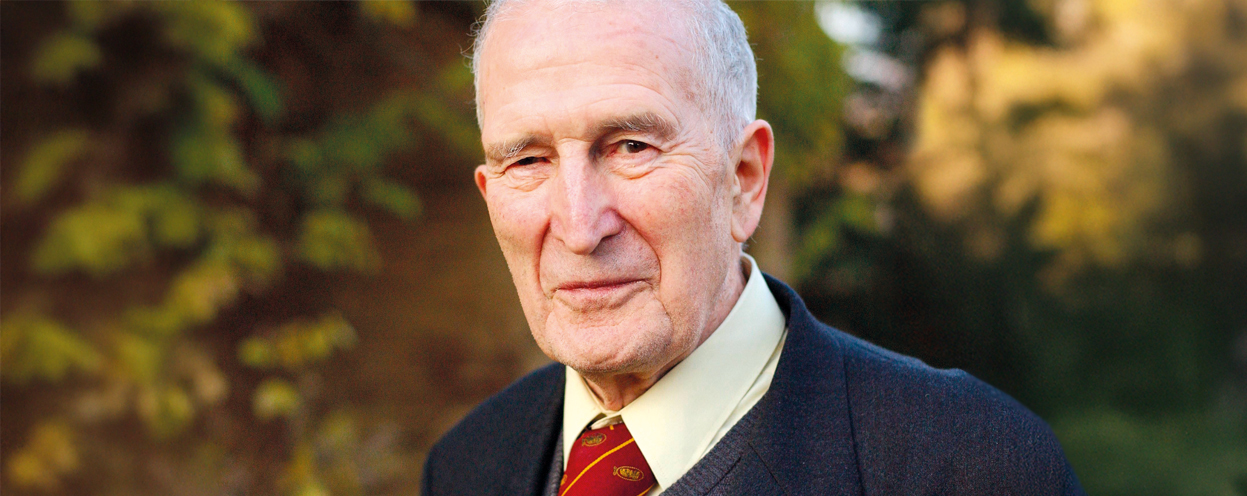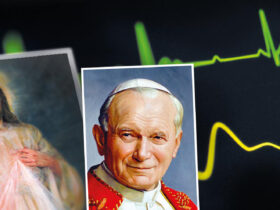Faith and Reason

In his encyclical Fides et ratio (Faith and Reason) and catechetical statements, St. John Paul II unmasks the false propaganda that tries to persuade society that the Christian belief in God is incompatible with science and reason; that atheism is a sign of progress, while those who believe in God represent a bastion of fanaticism, ignorance, and superstition.
Spiritual conversion of the guru of world atheism
On December 9, 2004, the Associated Press broke the shocking news that the world’s most famous atheist, the British philosopher Antony Flew, had changed his mind and now believed in God. Flew, who had been the figurehead and guru of world atheism since 1950, publically avowed his belief in God, while emphasizing that this certitude resulted from the most recent discoveries in the fields of biology, chemistry, and physics. “Now I believe in the existence of God,” he stated in his book There is a God; and he stressed that his discovery of the truth of the Creator’s existence was the culmination of a long intellectual journey during which he relied strictly on scientific facts and his reason.
How relevant are the texts of Holy Scripture in the light of this conversion. The Scriptures clearly state that man arrives at the truth of the Creator’s existence with the aid of his own reason by observing the world around him. We read in the Book of Wisdom: “For all men who were ignorant of God were foolish by nature; and they were unable from the good things that are seen to know him who exists. (…) For from the greatness and beauty of created things comes a corresponding perception of their Creator” (Wis 13: 1. 5). And Saint Paul adds: “For what can be known about God is plain to them, because God has shown it to them. Ever since the creation of the world his invisible nature, namely, his eternal power and deity, has been clearly perceived in the things that have been made. So they are without excuse” (Rom 1: 19-20). Who are “they”? Those “who by their wickedness suppress the truth” (Rom 1: 18). Sin so enslaves the mind and the heart of man, so warps his thinking, that he has difficulty accepting the truth of the existence of God. Saint Paul states that sinful men are rendered “futile in their thinking and their senseless minds [are] darkened. Claiming to be wise, they [become] fools” (Rom 1: 21-22). Saint John Paul II explains: “For the Bible, there lies in this foolishness a threat to life. The fool thinks he knows many things, but really he is incapable of fixing his gaze on the things that truly matter. Therefore he can neither order his mind (Prov 1:7) nor assume a correct attitude to himself or to the world around him. And so when he claims that ‘God does not exist’ (cf. Ps 14:1), he shows with absolute clarity just how deficient his knowledge is and just how far he is from the full truth of things, their origin and their destiny” (Fides et ratio, 18).
The brilliant British astronomer and mathematician, Sir Fred Hoyle (d. 2001), argued the absurdity of disbelief in God and the notion of life’s accidental origins. To believe in the random appearance of the first living cell was, in his words, like believing that a tornado passing over a scrap heap could result in the spontaneous assembly of a new Boeing.
The Catholic Church clearly teaches: “God, the beginning and end of all things, can be known with certainty from created reality by the light of human reason” (Dei verbum, 6). “If human beings with their intelligence fail to recognize God as Creator of all, it is not because they lack the means to do so, but because their free will and their sinfulness place an impediment in the way”—explains St. John Paul II (Fides et ratio, 19).
For Antony Flew, one of the most compelling scientific facts pointing to the existence of God as Creator was the discovery of human DNA. We know that DNA contains encoded within it a vast amount of information. Logically, then, there must exist an Intelligence that created this code (a kind of software of extreme complexity determining the most diverse characteristics of the human body (sex, color of eyes and hair, etc.). This Intelligence enables the information to direct the natural processes in such a way as to give rise to an extraordinarily complex biological organism. The information contained in the DNA molecule remains distinct from it, the DNA being only the bearer of this information. One might characterize this information as a complex piece of software or “cypher of thoughts,” and this points to the existence of a personal Intelligence. The structural units of DNA known as nucleotides form a logical whole and are linked together like the letters and words in a text of writing. Thus there is intelligence in DNA, and the information contained within it—as Dr. Michael J. Behe has shown—is neither matter nor energy.
In learning the truth about human DNA, Dr. Flew concluded that atheism has no logical basis and amounts to nothing more than a blind, irrational belief in the random appearance of life and the universe, which represents a harmonious whole functioning in accordance with logical principles. Flew characterized as “comic efforts” the attempts of atheist polemicist Richard Dawkins to explain the origins of life in terms of an accidental “felicitous happenstance.”
In his journey toward belief in God, Antony Flew drew great inspiration from Albert Einstein. Einstein observed that revealed in the laws of nature was so great an Intelligence that, confronted with It, the entire rationality of human thought appeared like a pale, meaningless reflection. In his book There is a God, Flew cites Einstein where he speaks of the certainty of the existence of a supreme, transcendental Intelligence that called the universe into existence and directs its progress: “I’m not an atheist,” wrote Einstein, “and I don’t think I can call myself a pantheist. We are in the position of a little child entering a huge library filled with books in many different languages. The child knows someone must have written those books. It does not know how. It does not understand the languages in which they are written. The child dimly suspects a mysterious order in the arrangement of the books but doesn’t know what it is. That, it seems to me, is the attitude of even the most intelligent human being toward God. We see a universe marvelously arranged and obeying certain laws, but only dimly understand these laws. Our limited minds cannot grasp the mysterious force that moves the constellations.”
Antony Flew’s book cites two more statements of faith by Einstein: “Everyone who is seriously involved in the pursuit of science becomes convinced a spirit is manifest in the laws of the Universe—a spirit vastly superior to that of man, and one in the face of which we with our modest powers must feel humble”; “My religion consists of a humble admiration of the illimitable superior spirit who reveals himself in the slight details we are able to perceive with our frail and feeble minds. That deep emotional conviction of the presence of a superior reasoning power, which is revealed in the incomprehensible universe, forms my idea of God.”
No contradiction between reason and faith
A mature faith always relies on reason, but at the same time, as Saint Augustine puts it, “I believe that I may understand.” Through the act of faith we accept the fact of God revealing Himself. We open ourselves up to an invisible spiritual reality, which we cannot comprehend either by reason or through our senses. Thus human reason enlightened by faith brings man to an objective knowledge of God, himself, and the ultimate meaning of human life, suffering, and death.
“Faith and reason,” writes St. John Paul II in his encyclical of that name, “are like two wings on which the human spirit rises to the contemplation of truth; and God has placed in the human heart a desire to know the truth—in a word, to know Him—so that, by knowing and loving God, men and women may also come to the fullness of truth about themselves” (Fides et ratio, 1). One wing is not enough on which to rise to a contemplation of the truth. We need two wings, reason and faith, which support and complete each other. Faith opens up to reason limitless perspectives and freedom in acquiring knowledge. Unsupported by reason, faith exposes itself to grave dangers, since it can limit itself to feelings and experiences and thus descend into superstition and myth. Faith always requires the support of reason, and reason always requires the support of faith. The Catholic Church teaches that it is a mistake to depend on reason alone (i.e. she condemns rationalism) just as it is a mistake to reject reason and rely exclusively on faith (i.e. she condemns fideism).
“Many scientists, past and present,” observed John Paul II in 1985, “see rigorously conducted scientific research as not only compatible, but even happily capable of integration with the sincere and joyous recognition of the existence of God.” The Holy Father recalled a survey made of 398 of the most illustrious scientists in the world. According to the poll, only 16 declared themselves non-believers; 15 considered themselves agnostics, and 367 were believers (cf. A. Eymieu, La part des croyants dans les progrès de la science, p. 274).
The vast majority of the world’s most outstanding scientists have been people of deep faith. We have only to recall some of the great scientific minds who were devout Catholics: Fr. Nicholas Copernicus (astronomy), the monk, Gregor Mendel (genetics), Antoine Lavoisier (chemistry), Enrico Fermi and Erwin Schrodinger (physics), Blaise Pascal (mathematics), and John von Neumann (computer science).
John Paul II cited the famous scientist Enrico Medi speaking in 1971 at the International Catechetical Congress in Rome. Indicating how, relying on their scientific research, scientists arrive at the logical conclusion that God the Creator exists, Medi observed: “I say to a young person: Look, there is a new star, a galaxy, a neutron star 100 million light-years away, yet the protons, electrons; neutrons and mesons which are found there are identical with those which are found in this microphone. Identicalness excludes probability. That which is identical is not probable. And so there is a cause, outside of space, outside of time, which imparts to being its proper form. This cause is God. This Being—I am speaking scientifically—which has caused things to be identical at a distance of billions of light-years, exists. And the number of identical particles in the universe is 10 raised to the 85th power. Shall we then take up the song of the Galaxies? If I were Francis of Assisi I would say: ‘O Galaxies of the immense heavens, give praise to my Lord, for he is omnipotent and good. O atoms, O protons, O electrons, O bird-songs, O blowing of the leaves and of the air, in the hands of man as a prayer, sing out the hymn which returns to God!’” (John Paul II, General Audience, Wednesday 17 July, 1985).
John Paul II stresses that the very texts of Holy Scripture teach us that man is capable of knowing God by reason alone. “[Man] is capable of a certain ‘knowledge’ about God, even though it is indirect and not immediate. Therefore, alongside the ‘I believe’ we find a certain ‘I know.’ This ‘I know’ concerns the existence of God and even, to a certain extent, his essence. (…) According to the Church, all our thinking about God, based on faith, also has a ‘rational’ and ‘intellective’ character” (John Paul II, General Audience, Wednesday, 20 March 1985).
For people of good faith, who sincerely seek to know the truth, reason and faith build on and perfect each other, forming a harmonious whole. Referring to the insights of the Angelic Doctor, St. Thomas Aquinas, John Paul II observes: “Both the light of reason and the light of faith come from God; hence there can be no contradiction between them. Faith therefore has no fear of reason, but seeks it out and has trust in it. Just as grace builds on nature and brings it to fulfillment, so faith builds upon and perfects reason. Illumined by faith, reason is set free from the fragility and limitations deriving from the disobedience of sin and finds the strength required to rise to the knowledge of the Triune God. Although he made much of the supernatural character of faith, the Angelic Doctor did not overlook the importance of its reasonableness; indeed he was able to plumb the depths and explain the meaning of this reasonableness. Faith is in a sense an ‘exercise of thought’; and human reason is neither annulled nor debased in assenting to the contents of faith, which are in any case attained by way of free and informed choice” (Fides et ratio, 43).
Conscientious and honest scientific research never contradicts faith in God; rather, it leads toward it. As the pastoral constitution Gaudium et spes states: “If methodical investigation within every branch of learning is carried out in a genuinely scientific manner and in accord with moral norms, it never truly conflicts with faith, for earthly matters and the concerns of faith derive from the same God. Indeed whoever labors to penetrate the secrets of reality with a humble and steady mind, even though he is unaware of the fact, is nevertheless being led by the hand of God, who holds all things in existence, and gives them their identity” (Gaudium et spes, 36).
The obedience of faith owed to God Who Reveals
In the light of his reason, man is capable of apprehending the existence of the Creator. But this apprehension of God, who reveals the whole truth about Himself, takes place on the level of faith—through a personal relationship of love with Him. It is God Himself who reveals to us directly that He is One in Three Persons, that “through Christ, the Word made flesh, man might in the Holy Spirit have access to the Father and come to share in the divine nature” (Dei verbum, 2). It is God who invites us to unite ourselves with Him in love. These and the other truths that God revealed to us can only be known on the level of faith supported by reason—“faith working through love” (Gal 5: 6).
St. John Paul II also observes that in revealing Himself to us, God provides us with an answer to the ultimate meaning of life. “Only in the mystery of the incarnate Word does the mystery of man take on light. Seen in any other terms, the mystery of personal existence remains an insoluble riddle. Where might the human being seek the answer to dramatic questions such as pain, the suffering of the innocent and death, if not in the light streaming from the mystery of Christ’s Passion, Death and Resurrection?” (Fides et ratio, 12). “‘The obedience of faith (…) is to be given to God Who Reveals, an obedience by which man commits his whole self freely to God, offering the full submission of intellect and will to God who reveals,’ and freely assenting to the truth revealed by Him” (Dei verbum, 5)
Through faith, i.e. through the act of complete self-giving to God, who is love, man comes to the fullest realization of his personal freedom. As John Paul states: “Indeed, it is faith that allows individuals to give consummate expression to their own freedom. Put differently, freedom is not realized in decisions made against God. For how could it be an exercise of true freedom to refuse to be open to the very reality, which enables our self-realization? Men and women can accomplish no more important act in their lives than the act of faith; it is here that freedom reaches the certainty of truth and chooses to live in that truth” (Fides et ratio, 13).
To live in faith is to offer oneself totally to God. It is to have boundless trust in Him and to carry out His will as expressed in the Commandments, the moral law, the teachings of the Church, the texts of Holy Scripture, and the voice of an upright conscience. Those who believe pray daily and avoid everything that has the appearance of evil (1 Thess 5: 22); and when they fall into serious sin, they immediately seek sacramental confession in which the miracle of Divine Mercy takes place: the forgiveness of all their sins.
The greatest experts in the journey of faith are the saints. Saint Faustina writes, “all that is needed [at first] is a bit of good will. If Jesus sees this little bit of good will in the soul, He hurries to give himself to the soul, and nothing can stop Him, neither shortcomings nor falls-absolutely nothing. Jesus is anxious to help that soul, and if it is faithful to this grace from God, it can very soon attain the highest holiness possible for a creature here on earth. God is very generous and does not deny His grace to anyone. Indeed He gives more than what we ask of Him” (Diary, 291).
Let us pray daily for the gift of a lively faith, for a complete, boundless and child-like trust in God. Let us also ask the Merciful God for the light of faith for the unbelieving and for the conversion of hardened sinners.






